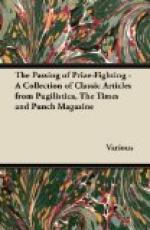* * * * *
Star of India (CASSELL) is what Mrs. ALICE PERRIN calls her latest novel, a title so good that I can only wonder why (or perhaps whether) it has not been used before. Inside also I found excellent entertainment. One supposes the author to have been confronted with two main problems with regard to her plot—how to make sufficiently plausible the marriage between a flapper (if you will forgive the odious word) of seventeen and a middle-ageing Anglo-Indian; and, secondly, how to impart any touch of novelty to the inevitable catastrophe that must attend this union. The first she has managed by a very cunning suggestion of the mingled jealousy, curiosity and boredom that drove Stella into the arms of her elderly suitor; the second by a variety of devices, to indicate which would be to give away the whole intrigue—one, I may say, whose climax is not nearly so visible from afar as that of most triangle tales. One point only I will reveal: Mrs. PERRIN has had the courage, while vindicating her own common-sense judgment upon such folk, to introduce a second girl, daughter and pupil of one of the spoon-fed idealists who would govern India with the platitudes of ignorance, and not only to make her sympathetic, but to convince me of her attractions, which (especially just now) was not easy work. Decidedly a first-rate yarn.
* * * * *
We may, I think, take it that the love-story in The Gunroom (BLACK) is fiction pure and naively simple, but that the experiences of John Lynwood, the hero, in the Navy are given as the actual experiences of Mr. C.L. MORGAN, the author. Let me then at once say that his revelations of the bullying of junior by senior midshipmen go back to a period before the War. These “shakings,” we are asked to believe, were due partly to custom and partly to boredom caused by lack of leave. If Mr. MORGAN is correct both in his facts and surmises it is satisfactory to think that the War must have obliterated the boredom which provoked such excesses, and one need not be a fanatical opponent of physical punishment to hope that such forms of tyranny will never again be tolerated as a matter of custom. I am obliged to conclude that these incidents in Lynwood’s career are absolutely true, for certainly nothing less than absolute truth could excuse their appearance in print; but at the same time I must confess that any attack upon our Navy is apt with me to act as an irritant. The more reason that I should honestly admit Mr. MORGAN’S merits and say that he writes with a nice sense of style, and that his book does not derive its only interest from its revelations.




